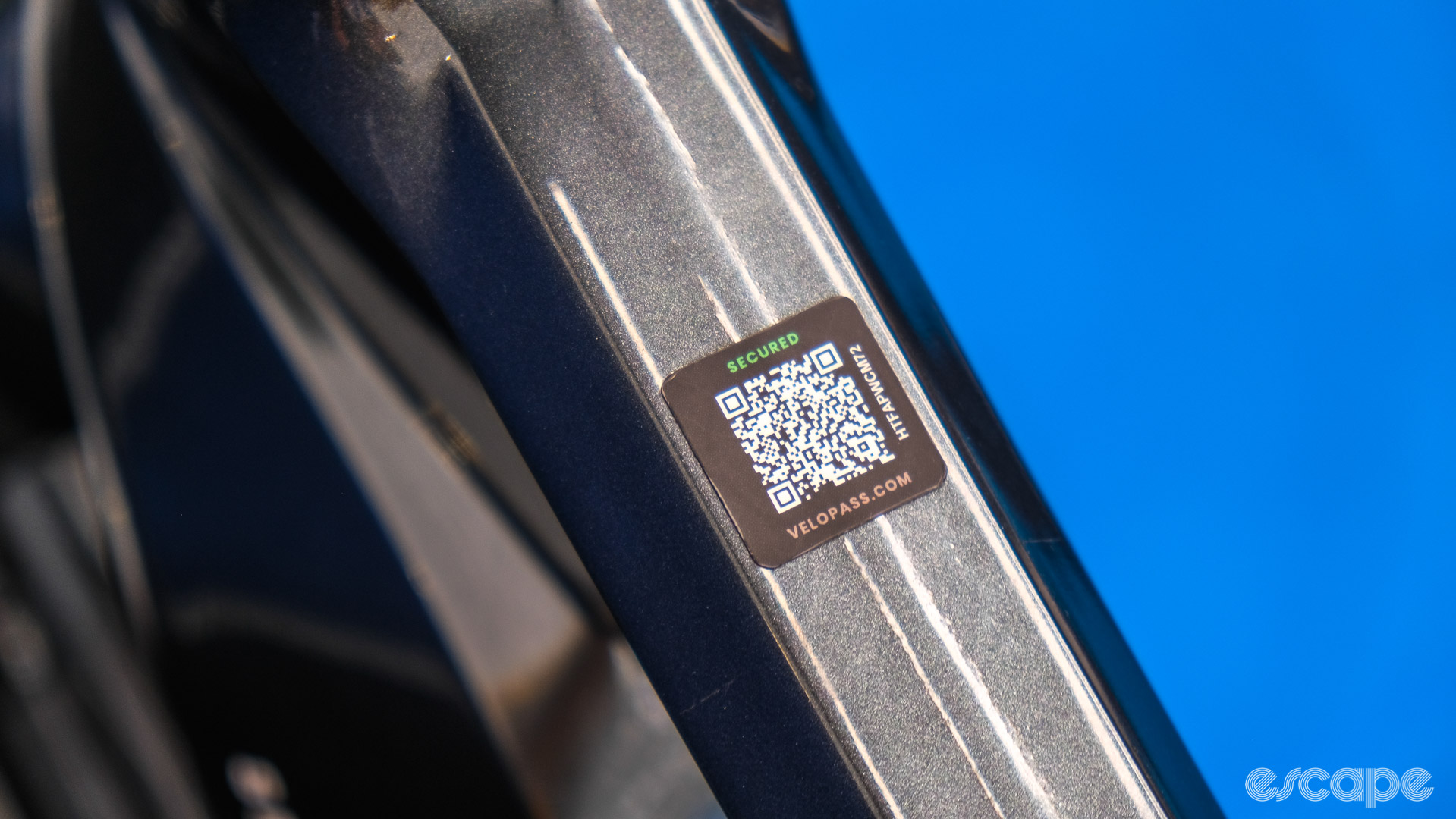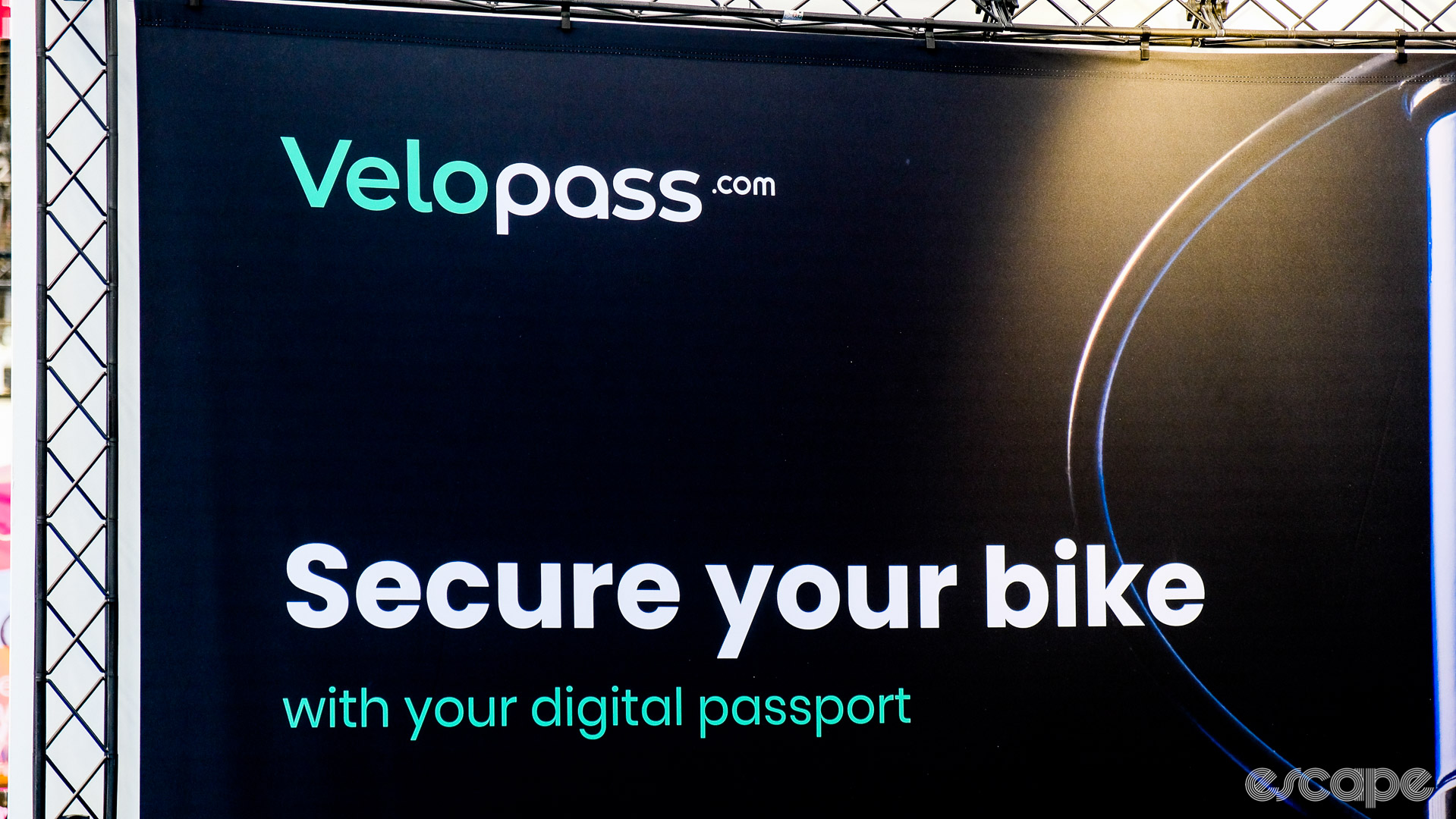If Velopass’s vision for a digital passport for your bike becomes reality, a tiny sticker on the frame will be the gateway to a global online platform connecting everyone in the bicycle industry from manufacturer to rider, in a seamless system that does everything from combatting bike theft to improving end-of-life sustainability. But there’s a long way to go to achieve that.
Velopass is the Belgian company behind the Velopass and Velopass Pro digital bike passports hoping to “connect all the parties in the bike industry” in an information exchange to improve bike maintenance, fleet management, security, and sustainability across the whole life cycle of a bike. Velopass says it has already proved its concept in Belgium and the Netherlands, is operational in France, and was at Eurobike as it prepares to expand into the rest of Europe.
The passport is housed in a sticker containing a QR code, a Velopass code unique to each passport and bike, an NFC (near-field communication) chip, and an aluminium base to improve the scanning. The Velopass is available in two options. One is applied by the manufacturer during production under the clear coat and as such is much more tamper proof; the other is an aftermarket sticker applied by the retailer or rider.
The shared online platform aims to connect riders and everyone in or even connected to the industry (like insurance companies) to provide individual bike data such as frame materials, components, service intervals, lease contracts, plus proof and transfer of ownership. Velopass provides this information to manufacturers, shops, and other industry parties to integrate into their own systems for tracking service, warranty, lease contracts etc., using the Velopass API through its Velopass pro offering, and more generally through its Velopass app through a simple QR code scan with a phone camera.

But I already have a frame number?
If we think of the serial number stamped on every frame as akin to a car’s VIN, or chassis number, the Velopass is like the car’s license plate or registration number. A quick scan quickly displays all relevant information for that vehicle. Crucially, Velopass aims to become the number-one identifier globally, meaning it can offer a central, easily accessible database for all this information be it owner, potential buyer, shop mechanic, or police requesting said data.
The aftermarket sticker contains the same QR code and NFC chip, but is obviously much less tamper-resistant, sitting as it does above the paintwork. Nevertheless, as the bike’s frame (aka serial) number is also registered during the application, should the sticker be removed, a bike can still be identified in the Velopass system using the frame/serial number because the two are linked in Velopass’s database.
While some brands have already adopted similar systems, many only offer simple information like model name, and in proprietary databases that are not widely accessible. Some police forces also offer aftermarket bike tagging, but again the information is typically only accessible to that local agency and contains much less detail. Velopass sees its true value in being an independent operator with one unique and easily accessible identifier storing all data on each individual bike, available to anyone, and lasting the entire lifecycle of any bike.
Take leasing companies, for example. Velopass claims leasing already accounts for around 70% of all new bikes in Belgium. The Velopass Pro passport connects leasing companies with retailers; a single scan can provide the digitised service contract for any bike entering a shop. Immediately a bike shop can identify the leasing company, lease contract, service budget and service interval requirements.
Insurance companies are currently showing the biggest interest and uptake as they see the value in the battle against bike theft. “If a stolen bike is found, it’s still very difficult to return it to its user” a representative from Velopass explained. The Velopass sticker would quickly and easily identify a bike’s true owner, making a return all the more likely should a bike be found. But Velopass also sees enormous potential in ensuring a stolen bike is found, and even preventing the theft in the first place.
Velopass is already seeing “positive trends” in the number of stolen bike recoveries when registered on its platform, although it does not yet have data available to share. This is partly due to simply having the ability to identify the owner if a bike is recovered. But longer term Velopass claims it is “the final step in combating bike theft.”
That’s an ambitious claim that rests on the company achieving two broad goals. First, that as its service becomes more widely known, the presence of the sticker itself could provide a deterrent for thieves, who may seek easier targets.
Second, the app allows bike owners to report a bike as stolen. Linked to that, potential buyers can scan a bike before purchasing it (you wouldn’t buy a car without doing a vehicle history check), reducing the ability for thieves to sell stolen bikes. Finally, if, as Velopass envisages, bike shops are eventually scanning bikes coming into a shop to retrieve other relevant data already stored on the Velopass (again think bringing your car in for a service). In all of those scenarios, the system would immediately flag a stolen bike. Again, certainly a possibility, but Velopass needs widespread awareness and adoption for that to come to pass.
The final, and perhaps most important potential of the Velopass offering is in improving sustainability and recycling at the end of a bike’s life cycle. Again with just a simple scan, recycling centres can identify what materials are in a frame and what components are attached to it (assuming they’ve not been replaced). Furthermore, riders can scan the Velopass to easily find the appropriate recycling centre in their area and learn how best to recycle any bike. Finally, going back to the bike shop again, as modern bikes become more and more complex, a Velopass scan could provide details on compatible parts and components long after manufacturers have discontinued a particular model, potentially speeding up the repair process, reducing service costs, and eventually keeping said bike in working order for longer.

Potential rollout
In all likelihood, the Velopass will only prove successful if the company succeeds in achieving widespread industry uptake, despite offering an aftermarket direct-to-customer option. As such, Velopass is focused on the industry market. The company is offering B2B API integration with unlimited bikes at €50 per month; a physical chip will cost €1.60, while the digitised lease cards cost 15 cents per month (€1.80 per year) per bike. The B2B offering is currently available to manufacturers, retailers, leasing companies, and insurance companies, etc, but the ultimate goal is likely to have manufacturers add the Velopass to all bikes during production.
Importantly, there is no cost to the bike owner or lessee through this B2B model. That said, if a rider does wish to get a Velopass for an existing bike, the company is offering those for a once-off price of €6.95.
Velopass says it has already proved its concept in Belgium and Netherlands and is now active in France, while the company plans to expand into the rest of Europe in the near future. Despite all this, a Velopass representative told Escape Collective at Eurobike it is still finding it difficult in convincing manufacturers to adopt the technology. Manufacturers seemingly “don’t want to share their data,” but the company hopes this will change with time as the service is expanded.
Furthermore, according to CircularOnline.co.uk, “the EU is expected to enforce a ‘Product Passport’, possibly as soon as 2025,” which will track the contents and origin of all consumer products through a QR code or similar digital trigger. Consider then that France has already made bike registration mandatory and government bodies there recognise Velopass as one such means of registration, it seems the Belgian company is already ideally placed to not only provide a tagging service to manufacturers, but to do so in a valuable way to everyone ever connected with any individual bike.
What did you think of this story?

